| Srl | Item |
| 1 |
ID:
132702
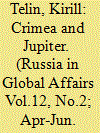

|
|
|
|
|
| Publication |
2014.
|
| Summary/Abstract |
The use of force is no longer legitimate like it was in the 19th and 20th centuries. Conservative-style action from the position of force cannot achieve anything in terms of boosting a country's position even within the traditional zone of influence.
|
|
|
|
|
|
|
|
|
|
|
|
|
|
|
|
| 2 |
ID:
132710
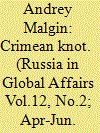

|
|
|
|
|
| Publication |
2014.
|
| Summary/Abstract |
Russia will have to deal with the effects of Crimea being part of an independent Ukraine for 23 years. A Crimean political and business elite has emerged with its own values, bonds, and relationships. Russia is not the motherland of an entire generation of Russian-speaking youth, but the motherland of their ancestors.
|
|
|
|
|
|
|
|
|
|
|
|
|
|
|
|
| 3 |
ID:
132698
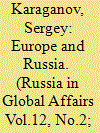

|
|
|
|
|
| Publication |
2014.
|
| Summary/Abstract |
Debates over the ongoing crisis in relations between Russia and the West revolve around the incorporation of Crimea, the global reaction to that move, and the future configuration of the Ukrainian state if, of course, it manages to survive (and I hope it will). But I contend that these are not the primary issues in global terms. There are other crucial questions. The first is what the European security system will be like. I repeat: the Old World was not allowed to withdraw from the Cold War, and now it may see a new round of tension. The second important question is whether Russia will be able to overcome the impasse in its development, in which it found itself after it restored statehood at the end of the 2000s. The third and closely linked question is whether Russia will wish to remain part - even an independent and very special partner - of Europe or will it opt for cultural-civilizational isolation and increasingly lean towards the East economically. It is obvious that Russia is firmly determined to change the rules of the game that have been dictated to it for the past twenty-five years. Unable and reluctant to toe the line, Russia has given up attempts to become part of the West.
|
|
|
|
|
|
|
|
|
|
|
|
|
|
|
|
| 4 |
ID:
132699
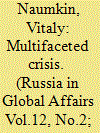

|
|
|
|
|
| Publication |
2014.
|
| Summary/Abstract |
The impact of the Ukrainian crisis on the existing world order proves to be so manifold that it is hard to predict its consequences, irrespective of its outcome. This short article touches upon only a few aspects of the problem.
|
|
|
|
|
|
|
|
|
|
|
|
|
|
|
|
| 5 |
ID:
132697
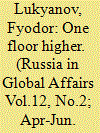

|
|
|
|
|
| Publication |
2014.
|
| Summary/Abstract |
It is already becoming habitual: yet another turn in world politics - and a fondly prepared portfolio of materials has to be shelved, and new ones made in an emergency mode. Witnessing epoch-making events is fascinating, but it takes a lot of nerve…
The period from February to April 2014 marked the sharpest turn in history since the end of the Cold War. We have witnessed the actual collapse of the Ukrainian statehood which emerged after the abolition of the Soviet Union, Crimea's entry into the Russian Federation, and an upsurge in confrontation between Moscow and the West. No wonder life made us revise our plans and devote the entire issue of Russia in Global Affairs to the changes which someone has already dubbed "Russian spring."
|
|
|
|
|
|
|
|
|
|
|
|
|
|
|
|
| 6 |
ID:
132708
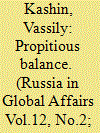

|
|
|
|
|
| Publication |
2014.
|
| Summary/Abstract |
The Ukrainian crisis has demonstrated once again that the global Chinese business empire is growing much faster than Beijing's military-political capabilities. There has again emerged a need for a more active Chinese policy to protect national interests.
|
|
|
|
|
|
|
|
|
|
|
|
|
|
|
|
| 7 |
ID:
134095
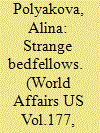

|
|
|
|
|
| Publication |
2014.
|
| Summary/Abstract |
The courtship between Eastern European far-right parties and Russia has been going on for years, of course. In 2008, Eastern Europe's far right supported the Russian war against Georgia. In May 2013, leaders of Jobbik, the Hungarian far-right party with dubious fascist origins, met with Russian Duma leaders and academics at Moscow State University. The neo-Nazi Bulgarian Ataka party has vocally supported Putin and Russian foreign policy. In 2012, Ataka's leader, Volen Siderov, traveled to Moscow, reportedly at his own expense, to celebrate Putin's sixtieth birthday and express admiration for the Russian president's strong leadership. After Russia's annexation of Crimea, Siderov threatened to withdraw his party's support from the coalition government if it supported further sanctions against Russia.
|
|
|
|
|
|
|
|
|
|
|
|
|
|
|
|
| 8 |
ID:
132134
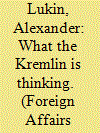

|
|
|
|
|
| Publication |
2014.
|
| Summary/Abstract |
Soon after the Soviet Union's collapse in 1991, Western leaders began to think of Russia as a partner. Although Washington and its friends in Europe never considered Moscow a true ally, they assumed that Russia shared their basic domestic and foreign policy goals and would gradually come to embrace Western-style democracy at home and liberal norms abroad. That road would be bumpy, of course. But Washington and Brussels attributed Moscow's distinctive politics to Russia's national peculiarities and lack of experience with democracy. And they blamed the disagreements that arose over the former Yugoslavia, Iraq, and Iran on the short time Russia had spent under Western influence. This line of reasoning characterized what could be termed the West's post-Soviet consensus view of Russia.
|
|
|
|
|
|
|
|
|
|
|
|
|
|
|
|
| 9 |
ID:
132716


|
|
|
|
|
| Publication |
2014.
|
| Summary/Abstract |
Amidst the Ukrainian crisis several statements were made in Kiev that Ukraine should develop nuclear weapons of its own. Although the probability is not high, this issue prompts an analysis of Ukraine's real nuclear potential in this sphere.
The Ukrainian political crisis of 2013-2014 brought to a head a discussion that had been going on before about Ukraine's nuclear status. Several statements were made in Kiev that Ukraine should develop nuclear weapons of its own. Advocates of this idea pleaded the non-fulfillment of the Budapest Memorandum of 1994 in which three nuclear powers - the United States, Britain and Russia - had provided security guarantees to Kiev in exchange for a waiver of the Soviet-era nuclear arsenal. In February-March 2014, statements to this effect were made, among others, by ex-foreign minister of Ukraine Volodymyr Ohryzko, Verkhovna Rada deputy Mykhailo Holovko of the All-Ukrainian Union Svoboda, and Verkhovna Rada deputy Oleh Lyashko, leader of the Radical Party of Ukraine. On March 1, 2014, this issue was discussed by the National Security and Defense Council of Ukraine
|
|
|
|
|
|
|
|
|
|
|
|
|
|
|
|
| 10 |
ID:
134093


|
|
|
|
|
| Publication |
2014.
|
| Summary/Abstract |
The Obama administration seems to believe that Vladimir Putin should not be taken too seriously. The annexation of Crimea and belligerence over Ukraine are, to quote the president and his secretary of state, a sign of "weakness," the hallmark of a "regional" power stuck in "the old ways of doing things," leading no bloc of nations and having "no global ideology." These assumptions may be comforting rationales for a lack of response to the Kremlin's recent moves, but they misread the game Putin is playing-and underestimate its significance.
|
|
|
|
|
|
|
|
|
|
|
|
|
|
|
|